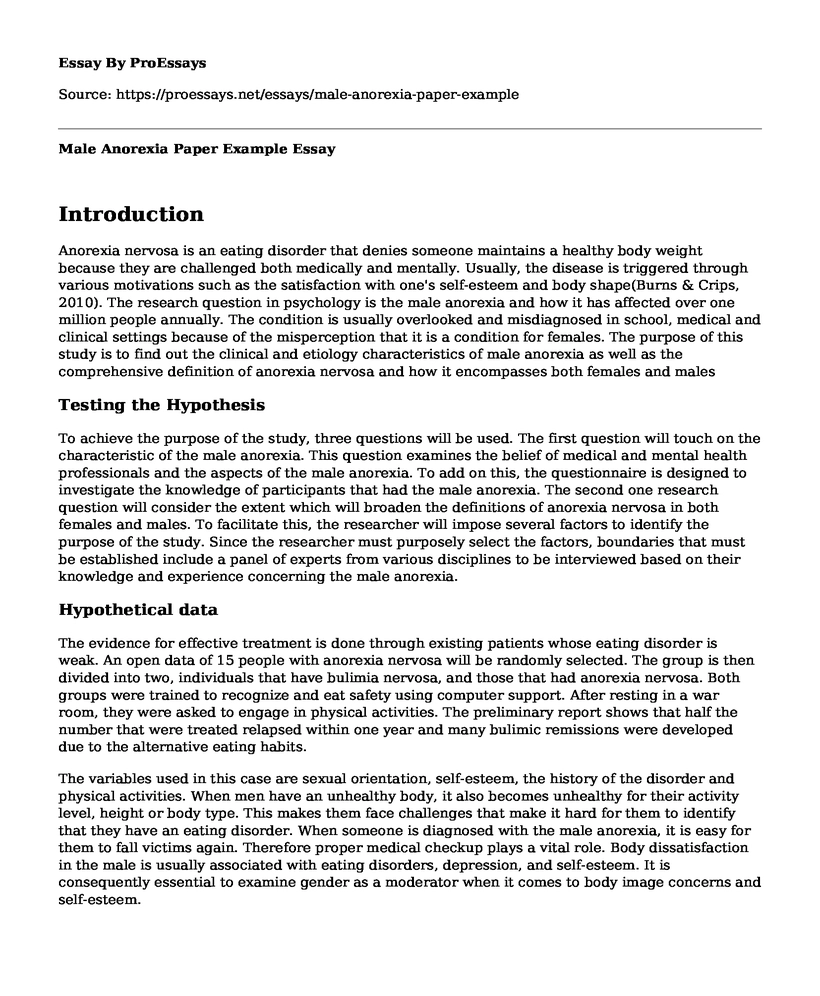Introduction
Anorexia nervosa is an eating disorder that denies someone maintains a healthy body weight because they are challenged both medically and mentally. Usually, the disease is triggered through various motivations such as the satisfaction with one's self-esteem and body shape(Burns & Crips, 2010). The research question in psychology is the male anorexia and how it has affected over one million people annually. The condition is usually overlooked and misdiagnosed in school, medical and clinical settings because of the misperception that it is a condition for females. The purpose of this study is to find out the clinical and etiology characteristics of male anorexia as well as the comprehensive definition of anorexia nervosa and how it encompasses both females and males
Testing the Hypothesis
To achieve the purpose of the study, three questions will be used. The first question will touch on the characteristic of the male anorexia. This question examines the belief of medical and mental health professionals and the aspects of the male anorexia. To add on this, the questionnaire is designed to investigate the knowledge of participants that had the male anorexia. The second one research question will consider the extent which will broaden the definitions of anorexia nervosa in both females and males. To facilitate this, the researcher will impose several factors to identify the purpose of the study. Since the researcher must purposely select the factors, boundaries that must be established include a panel of experts from various disciplines to be interviewed based on their knowledge and experience concerning the male anorexia.
Hypothetical data
The evidence for effective treatment is done through existing patients whose eating disorder is weak. An open data of 15 people with anorexia nervosa will be randomly selected. The group is then divided into two, individuals that have bulimia nervosa, and those that had anorexia nervosa. Both groups were trained to recognize and eat safety using computer support. After resting in a war room, they were asked to engage in physical activities. The preliminary report shows that half the number that were treated relapsed within one year and many bulimic remissions were developed due to the alternative eating habits.
The variables used in this case are sexual orientation, self-esteem, the history of the disorder and physical activities. When men have an unhealthy body, it also becomes unhealthy for their activity level, height or body type. This makes them face challenges that make it hard for them to identify that they have an eating disorder. When someone is diagnosed with the male anorexia, it is easy for them to fall victims again. Therefore proper medical checkup plays a vital role. Body dissatisfaction in the male is usually associated with eating disorders, depression, and self-esteem. It is consequently essential to examine gender as a moderator when it comes to body image concerns and self-esteem.
References
Burns, T., & Crisp, A. (2010). Factors Affecting Prognosis in Male Anorexics. Anorexia Nervosa and Bulimic Disorders, 323-328. doi:10.1016/b978-0-08-032704-4.50039-5
Cite this page
Male Anorexia Paper Example. (2022, Dec 06). Retrieved from https://proessays.net/essays/male-anorexia-paper-example
If you are the original author of this essay and no longer wish to have it published on the ProEssays website, please click below to request its removal:
- Psychodynamic Approaches to Counseling and Therapy
- Positive Psychology Essay: Happiness Comes From Outside and Within
- Placebo Theory and Stress Paper Example
- The Theme of Eating in Alice's Adventures in Wonderland - Essay Sample
- Essay Sample on Love and Hatred: Significant Factors in an Individual's Life
- Essay Sample on Feeling the Pressure: The Stress of Modern Life
- Tech Impact: Social & Cognitive Development in Teens - Annotated Bibliography







